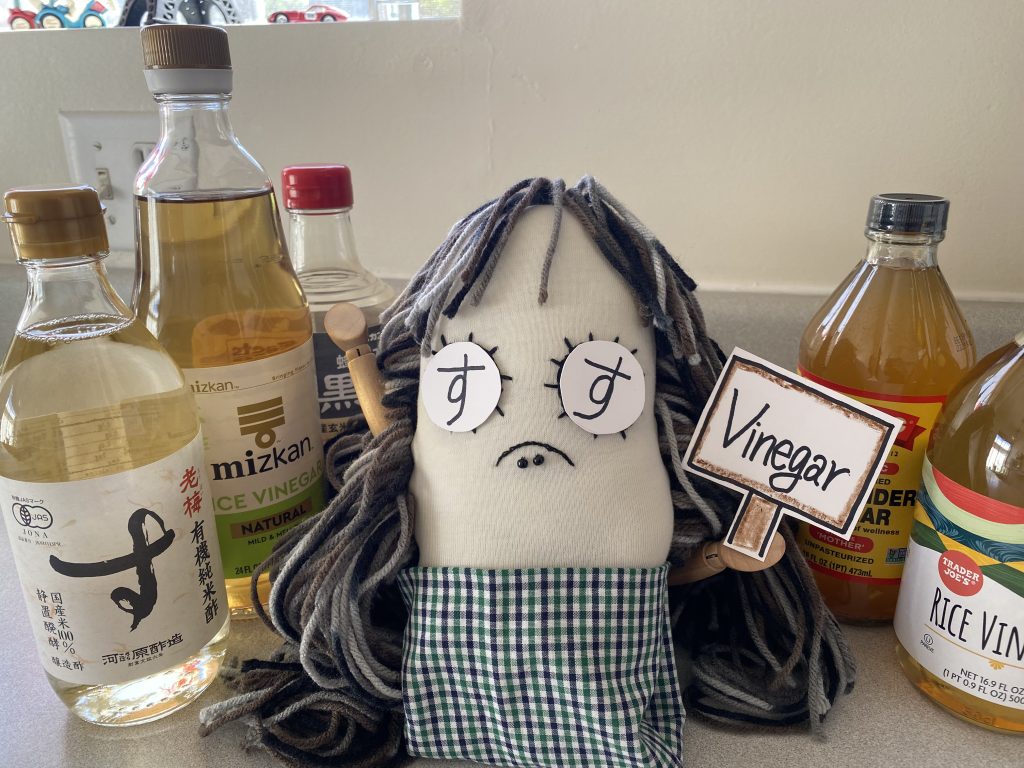
Why should we get vinegar for our long-term stockpile?
Do I really need vinegar?
Which vinegar should I get?
How can vinegar help us in an emergency?
Vinegar has been used as an ingredient in cooking, as a household cleaner, as medicine, as a preservative, and as a drink to increase energy and promote wellness (The Vinegar Institute). It sounds pretty amazing, but how does it work in emergency situations?
Personally, I don’t keep a lot of vinegar for my long-term stockpile,
but I do like to keep at least few bottles, mainly for the health benefits.
As you know, vinegar may be used to pickle food. Pickling is a preservation method that extends the shelf-life of perishable food by killing bacteria. But in an emergency situation, how much of your time will you realistically be able to spend preserving fresh food? Do we really need pickles?
I would think that finding fresh vegetables would be a better use of your time and energy in a crisis.
Making emergency pickles is a very low priority for me, but I still might like to have vinegar for use as a medicine or for the health benefits: increasing energy and boosting the immune system.
What is vinegar?
Vinegar is a clear solution made of acetic acid (5-20%) and water. It is made by a two-step fermentation process.
• First, through fermentation, yeast converts the sugar in fruits, whole grains, potatoes or rice into alcohol.
• Next, the alcohol is exposed to oxygen and acetic acid bacteria and is fermented again, over weeks and months, to form vinegar. (The fermentation process varies from type to type. For example, balsamic vinegar may ferment for up to 25 years.)
There are two main methods of vinegar production. ( Nakamura Persimmon Vinegar )
• Static fermentation: Long fermentation and aging period, resulting in a rich, mellow, and non-tangy vinegar.
• Rapid fermentation: Most of the vinegar you see in supermarkets is made by the fast brewing method. Using a machine to accelerate the activity of the acetic acid bacteria, this process usually results in vinegar with a strong and pungent flavor.
What are the health benefits of vinegar?
Vinegar contains minerals, vitamins and amino acids. It is said that vinegar has many health benefits, like these.
• Helps with losing weight.
• Helps prevent type 2 diabetes
• Relieves heartburn.
• Can lower cholesterol.
• Reduces varicose veins.
• Improves acne.
• Boosts energy.
The thing I like most about vinegar is that it “boosts energy.” The other benefits are OK, but for an emergency I don’t think that “losing weight” (for example) is going to be the priority. If we’re in a desperate emergency situation, we will need to keep our energy up, but we’re not going to worry so much about going on a diet.
When I was pregnant and had morning sickness, I tended to eat just sushi rice (with vinegar), and I didn’t eat raw fish top of the sushi. Also, when I was a kid, I used to eat just rice with vinegar. Vinegar’s sourness made me feel refreshed. From my experience, vinegar really does give an energy boost.
Vinegar contains amino acids and helps the immune system to become stronger. I strongly recommend you stock at least a few bottles of vinegar, and if you don’t end up using them, you can still make fresh pickles when the long term emergency is over.
This is MELISSA K NORRIS’s website, and she teaches us a simple way to make homemade vinegar.
Pure rice vinegar
My family is used to rice vinegar, so I pick it up for my long-term stockpile.
Rice vinegar is a condiment that comes from the fermentation of rice. It has a sweet, delicate flavor and is less acidic than most other types of vinegar. Most of the culinary uses of rice vinegar come from Asian cuisine. I am Japanese, and I use rice vinegar for sushi rice, dipping sauces, stir-fries, and salad dressings (especially for seaweed salads).
We will have a limited food supply in an emergency, and we have to figure out how vinegar can support the food that we have.
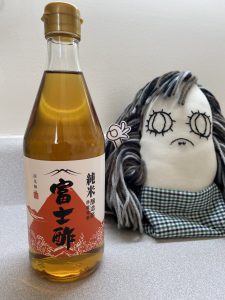
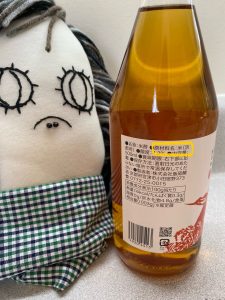
Junmai Fujisu vinegar is a pure rice vinegar made from only rice and water. For every liter of vinegar, they use 200g of rice. This is five times more than the minimum required to qualify as “rice vinegar.” Made from a large amount of rice, Junmai Fujisu has a characteristically strong and rich flavor.
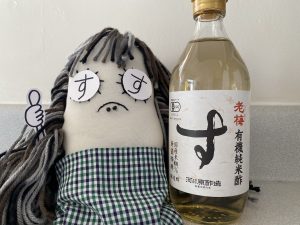
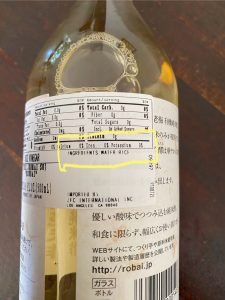
Roubai organic rice vinegar is made with organic Japanese rice and is brewed in the traditional method with rice and water.
How to Store
Store vinegar in a cool, dark place with a well-sealed lid, away from heat and light.
Things to Remember
● Please do not forget that before eating long-term stockpile foods, absolutely check the food’s appearance and smell. Trust your five senses. Eat
them at your own risk.
If you have big space and love vinegar, you will be able to buy many vinegar bottles for your stockpile. But you don’t necessarily have to get vinegar for your long-term stockpile. I would prefer to buy vinegar rather than buying certain other items for my stockpile (like nutritional supplements), and I want to be able to make sushi rice (without the raw fish) to give myself a moment of peace and pleasure.
Thank you MELISSA for teaching me how to make homemade vinegar!
See you next time.
Remember, “Protect your life by yourself” (自分の命は自分で守る). You need to survive first, and then you need your emergency supply. No matter how well you prepared your emergency supplies, if you die, then all of your preparations will have been for nothing. First and foremost, keep your health up all the time. Build your stamina so that if you need to, you can evacuate as quickly as possible. Stay healthy.